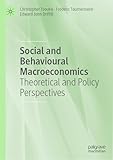Social and behavioural macroeconomics: theoretical and policy perspectives
Material type: TextPublication details: Cham Springer 2025Description: xix, 387 pISBN:
TextPublication details: Cham Springer 2025Description: xix, 387 pISBN: - 9783031777479
- 339.01 CHR
| Item type | Current library | Collection | Call number | Copy number | Status | Date due | Barcode | |
|---|---|---|---|---|---|---|---|---|
 Book
Book
|
Indian Institute of Management LRC General Stacks | Public Policy & General Management | 339.01 CHR (Browse shelf(Opens below)) | 1 | Available | 009175 |
Table of contents:
Front Matter
Pages i-xix
Download chapter PDF
Introduction: The Social and Behavioural Turn in Macroeconomics
Christopher Tsoukis, Frédéric Tournemaine, Edward John Driffill
Pages 1-40
Behavioural Economics: A Review
Christopher Tsoukis, Frédéric Tournemaine, Edward John Driffill
Pages 41-87
Sociality and Behavioural Traits in Macroeconomics
Christopher Tsoukis, Frédéric Tournemaine, Edward John Driffill
Pages 89-120
Socio-Behavioural Traits and Long-Run Growth
Christopher Tsoukis, Frédéric Tournemaine, Edward John Driffill
Pages 121-158
Hyperbolic Discounting, Labour Supply, and Growth
Christopher Tsoukis, Frédéric Tournemaine, Edward John Driffill
Pages 159-200
Hyperbolic Discounting and Macroeconomic Policy
Christopher Tsoukis, Frédéric Tournemaine, Edward John Driffill
Pages 201-253
Socio-Behavioural Traits and Inequality
Christopher Tsoukis, Frédéric Tournemaine, Edward John Driffill
Pages 255-298
Socio-Economics, Macroeconomics, and Finance
Christopher Tsoukis, Frédéric Tournemaine, Edward John Driffill
Pages 299-347
Back Matter
Pages 349-387
[https://link.springer.com/book/10.1007/978-3-031-77748-6]
Despite significant theoretical advances in social and behavioural macroeconomics, little has been done to synthesise the disparate developments in these fields and point the way forward to future research directions and policy implications. This book reviews, unifies and extends diverse strands of thinking and shows how these theories can be used to improve macroeconomic modelling for policy development in a range of spheres.
The book explores how the most empirically relevant socio-behavioural traits can widen the scope of macroeconomics to fruitfully address new issues and challenges, such as rising inequality, the change in the functional distribution of income (labour and capital shares), and a further understanding of the government spending multiplier. Chapters also address more traditional topics such as macroeconomic policy effectiveness, growth, saving and labour supply. Other, more open-ended themes of the book include whether the concept of individual rationality should be complemented by collective rationality; whether socio-behavioural traits underlie socially inefficient outcomes such as tragedies-of-the-commons, rat races, financial crises and global warming; and whether such traits can provide new foundations for (New) Keynesian macroeconomics.
This book will be essential reading for advanced researchers and students working in macroeconomics and other social sciences, including psychology and politics, as well as those working on the theoretical end of public policy
(https://link.springer.com/book/10.1007/978-3-031-77748-6)
There are no comments on this title.

